Photo credits: Harper’s Weekly/The Library of Congress
Dr. John S. Rock (shown) was one of the first African-Americans in the history of the United States to become a dentist.
He was born on October 13, 1825, in Salem, New Jersey. In addition to being a dental practitioner, Rock also carried the qualifications of a medical doctor. However, in 1859, Rock started pursuing a legal education in Boston, Massachusetts. In 1861, Dr. Rock obtained his admission to become a member of the Massachusetts Bar Association. He is also renowned for becoming the first African American to be admitted to the bar association of the United States Supreme Court.
On January 23, 1862, Rock officially spoke before the Massachusetts Anti-Slavery Society in Boston. In his address, Rock indicated that in his perspective, the U.S. Civil War between the Union and Confederacy was already beginning. He convinced his fellow abolitionists that the anti-slavery Union forces in the North would finally win. However, Rock also raised worries about the realities of post-war racism in America and the necessity for continuous campaigning against future vestiges of pro-slavery proponents.
The complete text of Dr. John S. Rock’s 1862 address to the Massachusetts Anti-Slavery Society reads as follows:
Ladies and Gentlemen: I am here not so much to make a speech as to add a little more color to this occasion. I do not know that it is right that I should speak, at this time, for it is said that we have talked too much already; and it is being continually thundered in our ears that the time for speech-making has ended, and the time for action has arrived. Perhaps this is so. This may be the theory of the people, but we all know that the active idea has found but little sympathy with either of our great military commanders or the national Executive; for they have told us, again and again, that “patience is a cure for all sores,” and that we must wait for the “good time,” which, to us, has been long a-coming.
It is not my desire, neither is it the time for me to criticize the government, even if I had the disposition so to do. The situation of the black man in this country is far from being an enviable one. Today our heads are in the lion’s mouth, and we must get them out the best way we can. To contend against the government is as difficult as it is to sit in Rome and fight with the Pope. It is probable that, if we had the malice of the Anglo-Saxon, we would watch our chances and seize the first opportunity to take our revenge. If we attempted this, the odds would be against us, and the first thing we should know would be—nothing! Most of us are capable of perceiving that the man who spits against the wind, spits in his own face!
While Mr. Lincoln has been more conservative than I had hoped to find him, I recognize in him an honest man, striving to redeem the country from the degradation and shame into which Mr. Buchanan and his predecessors have plunged it.
This nation is mad. In its devoted attachment to the Negro, it has run crazy after him and now, having caught him, hangs on with a deadly grasp, and says to him, with more earnestness and pathos than Ruth expressed to Naomi, “Where thou goest, I will go; where thou lodgest, I will lodge; thy people shall be my people, and thy God my God.”
Why this wonderful attachment? My brother (Mr. Remond) spoke ably and eloquently to you this afternoon and told of you of the cruel and inhuman prejudices of the white people of this country. He was right. But has he not failed to look on the other side of this question? Has he not observed the deep and abiding affection that they have for the Negro, which “neither height, nor depth, nor principalities, nor powers, nor things present nor to come, can separate from this love,” which reaches to their very souls?
I do not deny that there is a deep and cruel prejudice lurking in the bosoms of the white people of this country. It is much more abundant in the North than in the South. Here, it is to be found chiefly among the higher and lower classes; and there is no scarcity of it among the poor whites at the South. The cause of this prejudice may be seen at a glance.
The educated and wealthy class despise the Negro, because they have robbed him of his hard earnings, or, at least, have got rich off the fruits of his labor; and they believe if he gets his freedom, their fountain will be dried up and they will be obliged to seek business in a new channel. Their “occupation will be gone.” The lowest class hates him because he is poor, as they are, and he is a competitor with them for the same labor. The poor ignorant white man, who does not understand that the interest of the laboring classes is mutual, argues in this wise:
“Here is so much labor to be performed. That Negro does it. If he was gone, I should have his place.” The rich and the poor are both prejudiced from interest, and not because they entertain vague notions of justice and humanity. While uttering my solemn protest against this American vice, which has done more than any other thing to degrade the American people in the eyes of the civilized world, I am happy to state that there are many who have never known this sin, and many others who have been converted to the truth by the “foolishness of antislavery preaching,” and are deeply interested in the welfare of the race and never hesitate to use their means and their influence to help break off the yoke that has been so long crushing us. I thank them all and hope the number may be multiplied until we shall have a people who will know no man save by his virtues and his merits.
Now, it seems to me that a blind man can see that the present war is an effort to nationalize, perpetuate and extend slavery in this country. In short, slavery is the cause of the war: I might say, is the war itself. Had it not been for slavery, we should have had no war! Through two hundred and forty years of indescribable tortures, slavery has wrung out of the blood, bones, and muscles of the Negro hundreds of millions of dollars and helped much to make this nation rich. At the same time, it has developed a volcano which has burst forth, and, in a less number of days than years, has dissipated this wealth and rendered the government bankrupt!
And, strange as it may appear, you still cling to this monstrous iniquity, notwithstanding it is daily sinking the country lower and lower! Some of our ablest and best men have been sacrificed to appease the wrath of this American god. There was Fremont—God bless him — who, under the pretense of frauds in his contracts, to the amount of several thousand dollars, was set aside for a Hunker kidnapper. If Fremont made a mistake of a few thousand dollars,—which no one claims was intentional, on his part,—what do you think of the terrible delay which has a cost, and is costing, us two million a day? Who is responsible for this great sacrifice of treasure? Then, there was Mr. Cameron, the hem of whose garment was not soiled with Anti-Slavery, except what he got from his official position, as it was forced upon his convictions. But, standing where he did, he saw the real enemy of the country; and because he favored striking at its vitals, his head was cut off, and that of a Hunker’s substituted!
There is a storm in that cloud which, today, though no larger than a man’s hand, is destined to sweep over this country and wake up this guilty nation. Then we shall know where the fault is, and if these dry bones can live! The government wishes us to bring back the country to what it was before. This is possible; but what is to be gained by it? If we are fools enough to retain the cancer that is eating out our vitals when we can safely extirpate it, who will pity us if we see our mistake when we are past recovery? The Abolitionists saw this day of tribulation and reign of terror long ago and warned you of it, but you would not hear! You now say that it is their agitation, which has brought about this terrible civil war! That is to say, your friend sees a slow match set near a keg of gunpowder in your house and timely warns you of the danger which he sees is inevitable; you despise his warning and, after the explosion, say if he had not told you of it it would not have happened!
Now, when some leading men who hold with the policy of the President and yet pretend to be liberal argue that while they are willing to admit that the slave has an undoubted right to his liberty, the master has an equal right to his property; that to liberate the slave would be to injure the master, and a greater good would be accomplished to the country in these times by the loyal master’s retaining his property than by giving to the slave his liberty—
I do not understand it so. Slavery is treason against God, man, and the nation. The master has no right to be a partner in a conspiracy that has shaken the very foundation of the government. Even to apologize for it, while in open rebellion, is to aid and abet in treason. The master’s right to his property in human flesh cannot be equal to the slave’s right to his liberty. The former right is acquified, either by kidnapping or unlawful purchase from kidnappers, or inheritance from kidnappers. The very claim invalidates itself. On the other hand, liberty is the inalienable right of every human being; and liberty can make no compromise with slavery. The goodness of slavery to the master can bear no relative comparison to the goodness of liberty to the slave. Liberty and slavery are contraries and separated from each other as good from evil, light from darkness, heaven from hell.
We trace effects to their cause. The evils brought upon the slave and the free colored man is traced to slavery. If slavery is better than freedom, its effects must also be better; for the better effect is from the better cause, and the better results from the better principle; and conversely, of better effects and results, the causes and principles are better. The greater good is that which we would most desire to be the cause to ourselves and our friends, and the greater evil is that which would give us the deeper affliction to have involved upon them or ourselves. Now, there is no sane man who would not rather have his liberty, and be stripped of every other earthly comfort, and see his friends in a like situation, than be doomed to slavery with its indescribable category of cruelty and wrongs—
“Sometimes loaded with heavy chains,
and flogged till the keen lash stains.”
It may be an easy matter to apologize for slavery but after applying the great test,—the Golden Rule—of “doing unto others as we would have them do unto us,” we must admit that no apology can be made for slavery. And of all the miserable miscreants who have attempted to apologize for, and extol, the happy condition of the slave, I have never seen one of them willing to take the place of one of these so-called “happy creatures.”
Today, when it is a military necessity and when the safety of the country is dependent upon emancipation, our humane political philosophers are puzzled to know what would become of the slaves if they were emancipated! The idea seems to prevail that the poor things would suffer if robbed of the glorious privileges they now enjoy! If they could not be flogged, half-starved, and work to support in ease and luxury those who have never waived an opportunity to outrage and wrong them, they would pine away and die!
Do you imagine that the Negro can live outside of slavery? Of course, now they can take care of themselves and their masters too; but if you give them their liberty, must they not suffer? Have you never been able to see through all this? Have you not observed that the location of this organ of sympathy is in the pocket of the slaveholder and the man who shares in the profits of slave labor? Of course, you have, and pity those men who have lived upon their ill-gotten wealth. You know, if they do not have somebody to work for them, they must leave their gilded salons and take off their coats and roll up their sleeves and take their chances among the live men of the world. This, you are aware, these respectable gentlemen will not do, for they have been so long accustomed to living by robbing and cheating the Negro that they are sworn never to work while they can live by plunder.
Can the slaves take care of themselves? What do you suppose becomes of the thousands who fly ragged and penniless from the South every year, and scatter themselves throughout the free states of the North? Do they take care of themselves? I am neither ashamed nor afraid to meet this question.
Assertions like this, long uncontradicted, seem to be admitted as established facts. I ask your attention for one moment to the fact that colored men at the North are shut out of almost every avenue to wealth, and yet, strange to say, the proportion of paupers is much less among us than among you! Are the beggars in the streets of Boston colored men? In Philadelphia, where there is a larger free colored population than is to be found in any other city in the free states, and where we are denied every social privilege and are not even permitted to send our children to the schools that we are taxed to support or to ride in the city horsecars, yet even there we pay taxes enough to support our own poor, and have a balance of a few thousand in our favor, pressed and enslaved! Another reason is, this nation has wronged us and for this reason many hate us. The Spanish proverb is— “since I have wronged you, I have never liked you.” This is true not only of Spaniards and Americans but of every other class of people. When a man wrongs another, he not only hates him but tries to make others dislike him.
Strange as this may appear, it is nevertheless painfully true. You may help a man during his lifetime, and you are a capital fellow, but your first refusal brings down his ire and shows you his ingratitude. When he has got all he can from you, he has no further use for you. When the orange is squeezed, we throw it aside. The black man is a good fellow while he is a slave and toils for nothing, but the moment he claims his own flesh and blood and bones he is a most obnoxious creature, and there is a proposition to get rid of him! He is happy while he remains a poor, degraded, ignorant slave, without even the right to his own offspring. While in this condition, the master can ride in the same carriage, sleep in the same bed, and nurse from the same bosom.
But give this same slave the right to use his own legs, his hands, his body, and his mind, and this happy and desirable creature is instantly transformed into a miserable loathsome wretch, fit only to be colonized somewhere near the mountains of the moon, or eternally banished from the presence of all civilized beings. You must not lose sight of the fact that it is the emancipated slave and the free colored man whom it is proposed to remove—not the slave; this country and climate are perfectly adapted to Negro slavery; it is the free black that the air is not good for! What an idea! A country good for slavery, and not good for freedom! This idea is monstrous and unworthy of even the Fejee islanders. All the Emigration and Colonization Societies that have been formed, have been auxiliaries of the Slave Power and established for this purpose, and the great desire to make money out of our necessities.
It is true, a great many simple-minded people have been induced to go to Liberia and to Hayti, but, be assured, the more intelligent portion of the colored people will remain here; not because we prefer being oppressed here to being free men in other countries, but we will remain because we believe our future prospects are better here than elsewhere and because our experience has proved that the greater proportion of those who have left this country during the last thirty years have made their condition worse, and would have gladly returned if they could have done so. You may rest assured that we shall remain here—here, where we have withstood almost everything. Now, when our prospects begin to brighten, we are more encouraged to stay, pay off the old score, and have a reconstruction of things. There are those of us who believe that we have seen the star of our redemption rising in the east, and moving southward.
The government is now trying to untie the knot which must be cut. Here you perceive it is mistaken. The North is in error. She has suffered the South, like a wayward child, to do as she would, and now, when she would restrain her, she finds trouble. If you wish to prevent a pending evil, destroy the source at once. If the first sparks were quenched, there would be no flame, for how can he kill who dares not be angry? or how can he be perjured who fears an oath? All public outrages of a destroying tendency and oppression are but childish sports let alone till they are ungovernable. The choking of the fountain is the surest way to cut off the source of the river. The Government has not had the courage to do this. Having sown the wind, they are now reaping the whirlwind: but in the end, I think it will be conceded by all, that we shall have gathered in a glorious harvest.
I do not regard this trying hour as darkness. The war that has been waged on us for more than two centuries has opened our eyes and caused us to form alliances so that instead of acting on the defensive we are now prepared to attack the enemy. This is simply a change of tactics. I think I see the finger of God in all this. Yes, there is the handwriting on the wall:
I come not to bring peace, but the sword. Break every yoke, and let the oppressed go free.
I have heard the groans of my people and am come down to deliver them!
At present, it looks as though we were drifting into a foreign war; and if we do have one, slavery must go down with it. It is not the time now for me to discuss the relation of the black man to such a war. Perhaps no one cares what we think or how we feel on this subject. You think yourselves strong now. The wisest man and the strongest man are generally the most ignorant and the most feeble. Be not deceived. No man is so feeble that he cannot do you an injury! If you should get into a difficulty of this kind, it would be in your interest that we should be your friends. You remember the lion had need of the mouse. You have spurned our offers, and disregarded our feelings, and on this account, we have manifested but little interest in, and have been apparently indifferent observers of this contest; but appearances are deceitful— every man who snores is not asleep.
I believe the conduct of both the bond and the free has been exceedingly judicious. It is times like these that try men. It is storms and tern- pests that give reputation to pilots. If we have a foreign war, the black man’s services will be needed. Seventy-five thousand freemen capable of bearing arms, and three-quarters of a million of slaves wild with the enthusiasm caused by the dawn of the glorious opportunity of being able to strike a genuine blow for freedom, will be a power that “white men will be bound to respect.” Let the people of the United States do their duty, and treat us as the people of all other nations treat us—as men; if they will do this, our last drop of blood is ready to be sacrificed in defense of the liberty of this country. But if you continue to deny us our rights, and spurn our offers except as menials, colored men will be worse than fools to take up arms at all. We will stand by you, however, and wish you that success, which you will not deserve.
This rebellion for slavery means something! Out of it, emancipation must spring. I do not agree with those men who see no hope in this war. There is nothing in it but hope. Our cause is onward. As it is with the sun, the clouds often obstruct his vision, but in the end, we find there has been no standing still. It is true the government is but little more antislavery now than it was at the commencement of the war; but while fighting for its own existence, it has been obliged to take slavery by the throat, and sooner or later must choke her to death. Jeff Davis is to the slaveholders what Pharaoh was to the Egyptians, and Abraham Lincoln and his successor, John C. Fremont, will be to us what Moses was to the Israelites.
I may be mistaken, but I think the sequel will prove that I am correct. I have faith in God and gun-powder and lead, and believe we ought not to be discouraged. We have withstood the sixth trial, and in the seventh, our courage must not falter. I thank God I have lived to see this great day when the nation is to be weighed ion the balances, and I hope not found wanting. This State and the National Government have treated us most shamefully, but as this is not the first time, I suppose we shall live through it. In the hour of danger, we have not been found wanting. As the Government has not had the courage to receive the help that has been standing ready and waiting to assist her, we will now stand still, and see the salvation of our people.





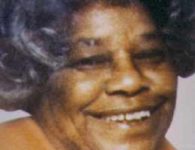
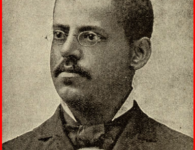

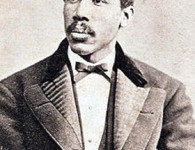
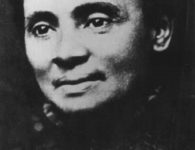







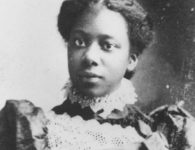


No comments